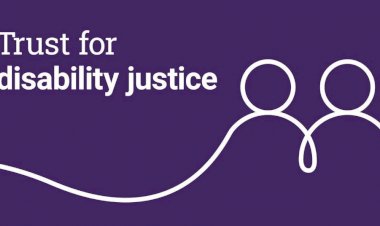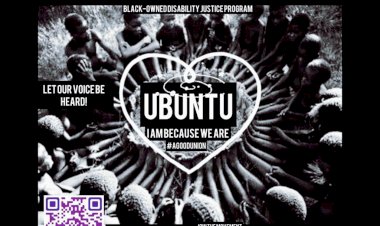The "Bikeshedding Effect" and the Neglected Voices of African and African Ancestry Neurodivergent and Disabled Communities
In human behaviour and decision-making processes, there is a common tendency to prioritise trivial matters over more complex and important issues. This phenomenon, known as Parkinson's Law of Triviality or the "bikeshedding effect," occurs because it is easier to understand and discuss trivial problems, while complex problems require deeper analysis and knowledge.

Parkinson’s Law of Triviality
The "Bikeshedding Effect" and the Neglected Voices of African and African Ancestry Neurodivergent and Disabled Communities
In human behaviour and decision-making processes, there is a common tendency to prioritise trivial matters over more complex and important issues. This phenomenon, known as Parkinson's Law of Triviality or the "bikeshedding effect," occurs because it is easier to understand and discuss trivial problems, while complex problems require deeper analysis and knowledge.
Background
Redefining “Anti-Black Bias” - Black news from the most important news sources in UK
Parkinson's Law of Triviality states that individuals within a group tend to spend a disproportionate amount of time and energy on trivial or unimportant issues while neglecting or avoiding more complex or important problems.
This is because trivial problems are easier to understand and discuss, while complex problems require deeper knowledge and analysis.
The law suggests that people often gravitate towards simpler problems because they are more comfortable and familiar with them. By focusing on trivial matters, individuals can avoid the challenges and uncertainties associated with tackling more complex issues.
However, it is important to note that Parkinson's Law of Triviality is not a scientific theory in the traditional sense. It is more of an observation or principle that highlights a common tendency in human behaviour and decision-making processes.
“Bikeshedding Effect”
We explore the application of Parkinson's Law of Triviality within African and African Ancestry neurodivergent and disabled communities.
This article wants to raise awareness of the challenges these communities face in having their voices heard and their unique needs addressed within the disability justice movement and broader societal contexts. By examining the consequences of such triviality, we can gain a deeper understanding of the unequal and lost opportunities for progress and inclusivity.
Manifestation
Within the African and African Ancestry neurodivergent and disabled communities in the United Kingdom, the phenomenon of Parkinson's Law of Triviality manifests as a persistent struggle to have our concerns and needs acknowledged.
While trivial (or lower priority and impact) issues often receive disproportionate attention, essential matters affecting our communities tend to be overlooked or misunderstood.
What are the consequences of this translation gap?
- Trivialisation of Neurodivergent and Disabled Communities
For instance, the media often focuses on surface-level discussions, such as the representation of disabilities in popular culture or the semantics of specific terminologies, rather than addressing systemic barriers to inclusion. This trivialisation not only diminishes the importance of substantive issues but also perpetuates stereotypes and hinders progress.
- Lack of Representation and Recognition
One aspect lost in translation is the lack of representation and recognition of African and African Ancestry neurodivergent and disabled individuals. Their unique experiences and challenges often go unnoticed, with mainstream narratives failing to acknowledge the intersectionality of their identities.
Do you accept that this oversight perpetuates a cycle and culture of marginalisation, hindering the development of tailored support systems, services, and policies that address our specific needs?
By trivialising our experiences, are the disability justice movement and society not overlooking the opportunity to create a more inclusive and equitable environment?
- Inadequate Healthcare and Support Services
Resources and funding often disproportionately focus on issues perceived as more relatable or easily understood by decision-makers.
Consequently, essential services, such as co-produced mental health support, accessible educational facilities, fair employment opportunities and working conditions, ownership, and economic empowerment receive inadequate attention and funding.
Does the disability justice movement accept that the resulting systemic neglect perpetuates cycles of inequality and further marginalises our communities? That some define and experience as the psychology of abuse and modern colonialism.
- Intersectionality and Multiple Marginalisation
Within African and African Ancestry neurodivergent and disabled communities, the impact of Parkinson's Law of Triviality is compounded by the intersectionality of our identities. We experience multiple forms of marginalisation, stemming from our delegated country of origin, race, ethnicity, disability, abilities, and neurodivergent traits.
This intersectionality further complicates our experiences and needs, making it even more crucial for society to move beyond trivial discussions and address the interwoven complexities of our lives.
- Cultural Stigma and Taboos
In some African and African Ancestry communities, there exists a knowledge gap and poor historical awareness and misinformation about mental ill health and disability in pre-colonial “Alkebulan Tribes”.
This gap allows for the negative presentation of a distorted and socially engineered profile of ‘cultural stigma and lack of awareness surrounding neurodivergent conditions and disabilities’ in our communities.
For more information on pre-colonial perspectives on disability or abilities, please download article 11 - https://drive.google.com/file/d/1wEEiS7hjMDdh0899annTHejT7kkO-_tp/view?usp=drive_link
This further perpetuates the trivialisation of our experiences, as societal conditioning and attitudes often dismiss or downplay our struggles. Consequently, disabled individuals within these communities face deeper isolation, illegal discrimination, and inappropriate and limited access to appropriate support systems.
- Language and Communication Barriers
The translation of concerns and needs within African and African Ancestry neurodivergent and disabled communities is also hindered by language and communication barriers.
Many individuals within our communities do not have access to inclusive and culturally sensitive resources, resulting in a lack of accurate information and understanding. This further contributes to the trivialisation of our experiences, amplified voices are often lost or misrepresented in broader discussions.
- Empowering Community Advocacy
To address the challenges posed by Parkinson's Law of Triviality, we want to support African and African Ancestry neurodivergent and disabled communities to be their advocates.
By providing ward, borough, and regional platforms for community voices to be heard, building capacity, fostering leadership development, and supporting grassroots disabled peoples organisations initiatives, the disability justice movement and society offer an option to fairly amplify the concerns and experiences of these communities.
BME Volunteer's CIC approach enables the infrastructure to drive change, challenge triviality, and shape policies and practices that reflect their unique needs.
- Inclusive Policy and Legislation
By engaging in decision-making processes, policymakers can gain valuable insights and develop targeted initiatives that address the systemic barriers specific to our ethnicity. Inclusive policies should undertake historical fact-checking, encompassing areas such as ubuntu, education, employment, healthcare, and accessibility, reflecting the diverse experiences and solutions for needs identified with and within United Kingdom disabled communities.
Take Away’s
- Raising awareness of the topic of Parkinson's Law of Triviality within African and African Ancestry neurodivergent and disabled communities helps reveal and explain aspects of the nuanced complexities we face.
- Intersectionality internalized and misinformed cultural stigmas, language and communication barriers, community empowerment, and inclusive policies all play crucial roles in bridging the translation gap and addressing the trivialisation of our experiences.
- If we can recognize and address these multifaceted challenges, the disability justice movement and society may just be able to foster a more inclusive and equitable environment that values the voices and needs of all communities.
equality@blackmajor.onmicrosoft.com


























